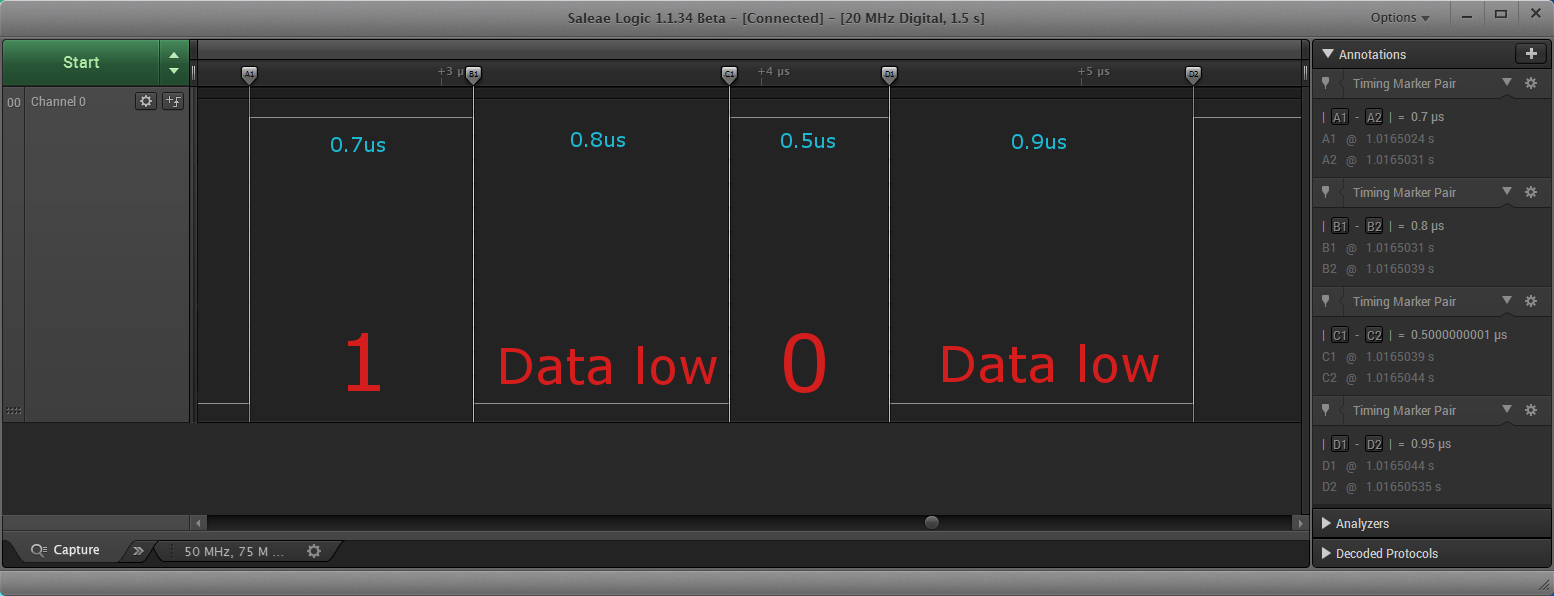Library for the WS2812 LED Driver. Uses bit banging and nops for precise timing. Number of nops executed are configurable at run time.
Dependents: WS2812_Example WS2812_Example_fade Lamp_03 Lamp_04 ... more
This library uses bit banging to control the LED strip. Because the mbed platform doesn't have a timer standardized that doesn't have a resolution lower a microsecond, we have to use NOPs. Also, the time it takes to toggle a GPIO pin is not consistent across platforms and it does not correlate to the system clock in any way. It is completely dependent on the platform's implementation.
I have a found the timings for a few boards. They are currently listed on the example program page below.
Import programWS2812_Example
Example for WS2812 Library
When using this on a new platform, you'll need to use a logic analyzer to determine the timings.

Above is a screenshot from a Saleae logic analyzer. You'll notice that the "1" pulse is longer than the "0" pulse. The "Data low" pulses should be consistent. The timing requirements for these pulses can be found below (Source: http://wp.josh.com/2014/05/13/ws2812-neopixels-are-not-so-finicky-once-you-get-to-know-them/).

If you find timings for a new board you're using, please PM me or start a discussion below and I'll add it to this page!
For more on the timings and data format of the WS2812 drivers, you should read the datasheet and the article "NeoPixels Revealed: How to (not need to) generate precisely timed signals" listed below.
References:
WS2812B Datasheet: https://www.adafruit.com/datasheets/WS2812B.pdf
"NeoPixels Revealed: How to (not need to) generate precisely timed signals": http://wp.josh.com/2014/05/13/ws2812-neopixels-are-not-so-finicky-once-you-get-to-know-them/
WS2812.cpp
- Committer:
- bridadan
- Date:
- 2015-02-12
- Revision:
- 2:6e647820f587
- Parent:
- 1:aadbf08c62a2
File content as of revision 2:6e647820f587:
#include "WS2812.h"
WS2812::WS2812(PinName pin, int size, int zeroHigh, int zeroLow, int oneHigh, int oneLow) : __gpo(pin)
{
__size = size;
__transmitBuf = new bool[size * FRAME_SIZE];
__use_II = OFF;
__II = 0xFF; // set global intensity to full
__outPin = pin;
// Default values designed for K64f. Assumes GPIO toggle takes ~0.4us
setDelays(zeroHigh, zeroLow, oneHigh, oneLow);
}
WS2812::~WS2812()
{
delete[] __transmitBuf;
}
void WS2812::setDelays(int zeroHigh, int zeroLow, int oneHigh, int oneLow) {
__zeroHigh = zeroHigh;
__zeroLow = zeroLow;
__oneHigh = oneHigh;
__oneLow = oneLow;
}
void WS2812::__loadBuf(int buf[],int r_offset, int g_offset, int b_offset) {
for (int i = 0; i < __size; i++) {
int color = 0;
color |= ((buf[(i+g_offset)%__size] & 0x0000FF00));
color |= ((buf[(i+r_offset)%__size] & 0x00FF0000));
color |= (buf[(i+b_offset)%__size] & 0x000000FF);
color |= (buf[i] & 0xFF000000);
// Outut format : GGRRBB
// Inout format : IIRRGGBB
unsigned char agrb[4] = {0x0, 0x0, 0x0, 0x0};
unsigned char sf; // scaling factor for II
// extract colour fields from incoming
// 0 = green, 1 = red, 2 = blue, 3 = brightness
agrb[0] = (color & 0x0000FF00) >> 8;
agrb[1] = (color & 0x00FF0000) >> 16;
agrb[2] = color & 0x000000FF;
agrb[3] = (color & 0xFF000000) >> 24;
// set the intensity scaling factor (global, per pixel, none)
if (__use_II == GLOBAL) {
sf = __II;
} else if (__use_II == PER_PIXEL) {
sf = agrb[3];
} else {
sf = 0xFF;
}
// Apply the scaling factor to each othe colour components
for (int clr = 0; clr < 3; clr++) {
agrb[clr] = ((agrb[clr] * sf) >> 8);
for (int j = 0; j < 8; j++) {
if (((agrb[clr] << j) & 0x80) == 0x80) {
// Bit is set (checks MSB fist)
__transmitBuf[(i * FRAME_SIZE) + (clr * 8) + j] = 1;
} else {
// Bit is clear
__transmitBuf[(i * FRAME_SIZE) + (clr * 8) + j] = 0;
}
}
}
}
}
void WS2812::write(int buf[]) {
write_offsets(buf, 0, 0, 0);
}
void WS2812::write_offsets (int buf[],int r_offset, int g_offset, int b_offset) {
int i, j;
// Load the transmit buffer
__loadBuf(buf, r_offset, g_offset, b_offset);
// Entering timing critical section, so disabling interrupts
__disable_irq();
// Begin bit-banging
for (i = 0; i < FRAME_SIZE * __size; i++) {
j = 0;
if (__transmitBuf[i]){
__gpo = 1;
for (; j < __oneHigh; j++) {
__nop();
}
__gpo = 0;
for (; j < __oneLow; j++) {
__nop();
}
} else {
__gpo = 1;
for (; j < __zeroHigh; j++) {
__nop();
}
__gpo = 0;
for (; j < __zeroLow; j++) {
__nop();
}
}
}
// Exiting timing critical section, so enabling interrutps
__enable_irq();
}
void WS2812::useII(BrightnessControl bc)
{
if (bc > OFF) {
__use_II = bc;
} else {
__use_II = OFF;
}
}
void WS2812::setII(unsigned char II)
{
__II = II;
}

 Generic WS2812 Driver
Generic WS2812 Driver